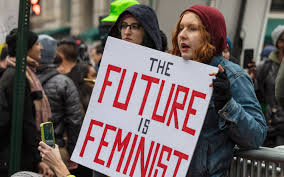Stop pretending to represent me
2019 Democratic women entering Congress
January 10, 2019
2018 has officially been announced to be the second “Year of the Woman,” with a record-breaking 102 women in Congress thus far due to the past midterm elections.
The last time the country has ever seen anything like this was in 1992. At that time, it was seen as the first major rise in the number of women in Congress.
This grand social progression makes it seems as if the worries of diversity in our Congress seems to be less of a problem. Yet, with this social progression, we must keep in mind that reforms shouldn’t be based on perceptible diversity, but rather the specific values and platforms that each individual candidate represents.
While I believe having a large number of women being sworn into Congress is a major step towards the goal of gender equality representation in our government, we should elect not just women, but all politicians to Congress based on their policies rather than just their gender.
When women are up for a political position, often times, voters believe that women are more liberal. Tiffany D. Barnes, an associate professor in the Department of Political Science at the University of Kentucky, did find that women tend to be more liberal than their male counterparts. However, there are plenty of candidates that prove this trend untrue; simply because women are perceived as liberal compared to men shouldn’t mean we automatically vote for them (or not voting for them) without taking a careful look at their propositions.
It has been proven that a majority of voters vote for women for the sake of diversity, often ignoring their policies, introducing an unnoticed wave of ignorance into a movement that has potential to produce a much more progressive government.
Sady Doyle, a feminist writer for Medium Politics, states that 65 percent of all female candidates win their primary races. “Being female has helped a candidate more than almost any other factor, including previous experience, military status or endorsement by name-brand politicians.”
Female candidates, inadvertently or not, use their identity as a woman to obtain more voters. This, at times, has done nothing, but undermined the feminist movement, rather than further it.
Feminism IS advocating for all women’s rights.
Feminism IS calling for social progression.

Feminist walking in the Women’s March 2018
Feminism is NOT decreasing funding for Planned Parenthood or endorsing a candidate with several sexual allegations made against them. Feminism has been diminished into a term associated with anything a woman does, rather than the assessment of the quality of the actions pursued by those women.
More recently, look at Brett Kavanaugh’s nomination. Sixty-nine percent of Republican women supported Kavanaugh, and Susan Collins’ decision to nominate Kavanaugh was a shock to men and women that it even swayed other voters to agree. This sends a questionable message to the activists in this country. I mean, not only does it undermine the gender equality movement as a whole, especially the #MeToo movement, but to elect Kavanaugh to such a superior government position, while ignoring the woman that he very likely abused, essentially gives women who have gone through sexual abuse the message that, their abuser will never face consequences. When women in positions of power choose not to believe the woman, women everywhere are hurt.
With such little representation in Congress, every action that the few women that have government positions take is perceived as the decision of all women in the country. To continue to accept current policies and shamelessly follow their conservative male counterparts truly stagnates social progression.
The most common argument made is that shaming other women in Congress is even worse for the movement.
Nancy Pelosi, Speaker of the United States House of Representatives, considers it ridiculous to not vote for a woman as a woman; gender is the reason she is running for a campaign, stating “‘If Hillary had won, I could go home.’” Yes, equality is important, but there has to be more substance to a campaign than that. There shouldn’t be a gender quota that needs to be met in order for their presence to serve a purpose.
I’m not saying that no change has been made. A number of strong, Democratic women have been elected to Congress. Nonetheless, it is essential to remember the importance of continuing to prioritize platforms above identity to ensure the constancy of this reform.
The harder part is acknowledging that not all women are feminists and being brave enough to stand up to those blinded by the pseudo-feminist movement. It isn’t wrong to denounce a feminist movement that doesn’t represent true feminism.
As a country, I believe that we shouldn’t be striving for more “Years of the Woman” anymore; instead, we should strive for the “Year of the Feminist.”










heid-dog • Feb 14, 2019 at 5:50 pm
yaid-dog, this writing is amazing, every piece you write blows my mind.